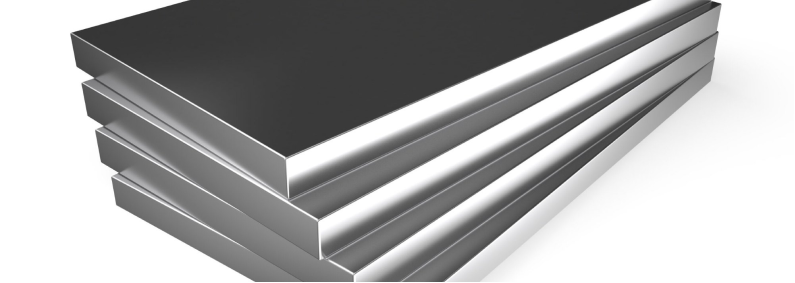Titanium Grade 2 and Grade 7

Titanium Grade 2 and Grade 7 are highly versatile titanium alloys widely used across industries for their excellent corrosion resistance, high strength-to-weight ratio, and biocompatibility. While both grades offer outstanding performance, they are optimized for different environments and applications.
Titanium Grade 2: The Workhorse Titanium
Titanium Grade 2 is an unalloyed titanium known for its excellent corrosion resistance, moderate strength, and superior formability. Its balance of properties makes it one of the most commonly used titanium grades.
Key Features of Titanium Grade 2
- Corrosion Resistance: Exceptional resistance to corrosion in oxidizing and mildly reducing environments, including seawater and chemical exposure.
- Lightweight and Strong: High strength-to-weight ratio makes it ideal for applications where weight savings are crucial.
- Excellent Formability: Easily machined, welded, and fabricated for a wide range of industrial uses.
- Biocompatibility: Non-toxic and suitable for medical implants and equipment.
Chemical Composition of Titanium Grade 2
Element | Percentage |
Titanium (Ti) | 99.2 (minimum) |
Iron (Fe) | 0.30 (maximum) |
Oxygen (O) | 0.25 (maximum) |
Carbon (C) | 0.08 (maximum) |
Nitrogen (N) | 0.03 (maximum) |
Hydrogen (H) | 0.015 (maximum) |
Titanium Grade 7: Enhanced Corrosion Resistance
Titanium Grade 7 is a titanium-palladium alloy offering enhanced corrosion resistance in extreme environments, particularly where reducing agents like hydrogen sulfide are present. The addition of palladium gives Grade 7 superior resistance to crevice and pitting corrosion.
Key Features of Titanium Grade 7
- Unmatched Corrosion Resistance: Excellent performance in reducing and oxidizing environments, including chlorides, brines, and acids.
- High Strength and Ductility: Retains strength while offering good flexibility and toughness.
- Weldability: Easily welded without losing its corrosion-resistant properties.
- Chemical Resistance: Exceptional resistance to hydrogen embrittlement.
Chemical Composition of Titanium Grade 7
Element | Percentage |
Titanium (Ti) | 99.1 (minimum) |
Palladium (Pd) | 0.12-0.25 |
Iron (Fe) | 0.30 (maximum) |
Oxygen (O) | 0.25 (maximum) |
Carbon (C) | 0.08 (maximum) |
Nitrogen (N) | 0.03 (maximum) |
Hydrogen (H) | 0.015 (maximum) |
Applications
Titanium Grade 2
- Marine: Heat exchangers, desalination plants, and seawater piping systems.
- Aerospace: Airframes, engine components, and structural parts.
- Medical: Surgical implants, dental implants, and prosthetics.
- Industrial: Chemical processing equipment, reactors, and storage tanks.
Titanium Grade 7
- Chemical Processing: Equipment handling highly corrosive substances like chlorides, acids, and brines.
- Marine Engineering: Piping systems and offshore structures exposed to aggressive seawater.
- Energy: Components in geothermal and nuclear power plants.
- Desalination: Parts requiring resistance to high-salinity water environments.
Mechanical Properties
Property | Titanium Grade 2 | Titanium Grade 7 |
Tensile Strength | 344 MPa (50 ksi) | 344 MPa (50 ksi) |
Yield Strength | 275 MPa (40 ksi) | 275 MPa (40 ksi) |
Elongation | 20% | 20% |
Hardness | 99 HRB | 99 HRB |
Available Forms
- Sheets & Plates: For marine, aerospace, and industrial use.
- Bars & Rods: Ideal for machining and structural parts.
- Pipes & Tubes: For high-temperature or corrosive fluid transport.
- Fittings: Custom parts for piping systems.
- Wires: Used in medical and precision tools.
- Forgings: Strong, shaped components for critical use.
FAQs
Grade 7 contains palladium, which provides superior corrosion resistance, especially in highly aggressive chemical environments, compared to Grade 2.
Yes, both grades offer excellent weldability, although Grade 7 retains its corrosion-resistant properties better after welding.
Grade 7 is preferred for seawater applications due to its enhanced resistance to crevice corrosion and pitting caused by chlorides.

Products
Industry We Serve
- Oil & Gas industries
- Chemical process industries
- Pump and valve in high pressure component
- Food industries
- Pulp and paper industry
- Aerospace industry
- Power plant
- Mechanical component
- Sugar industry
- Cement industry
